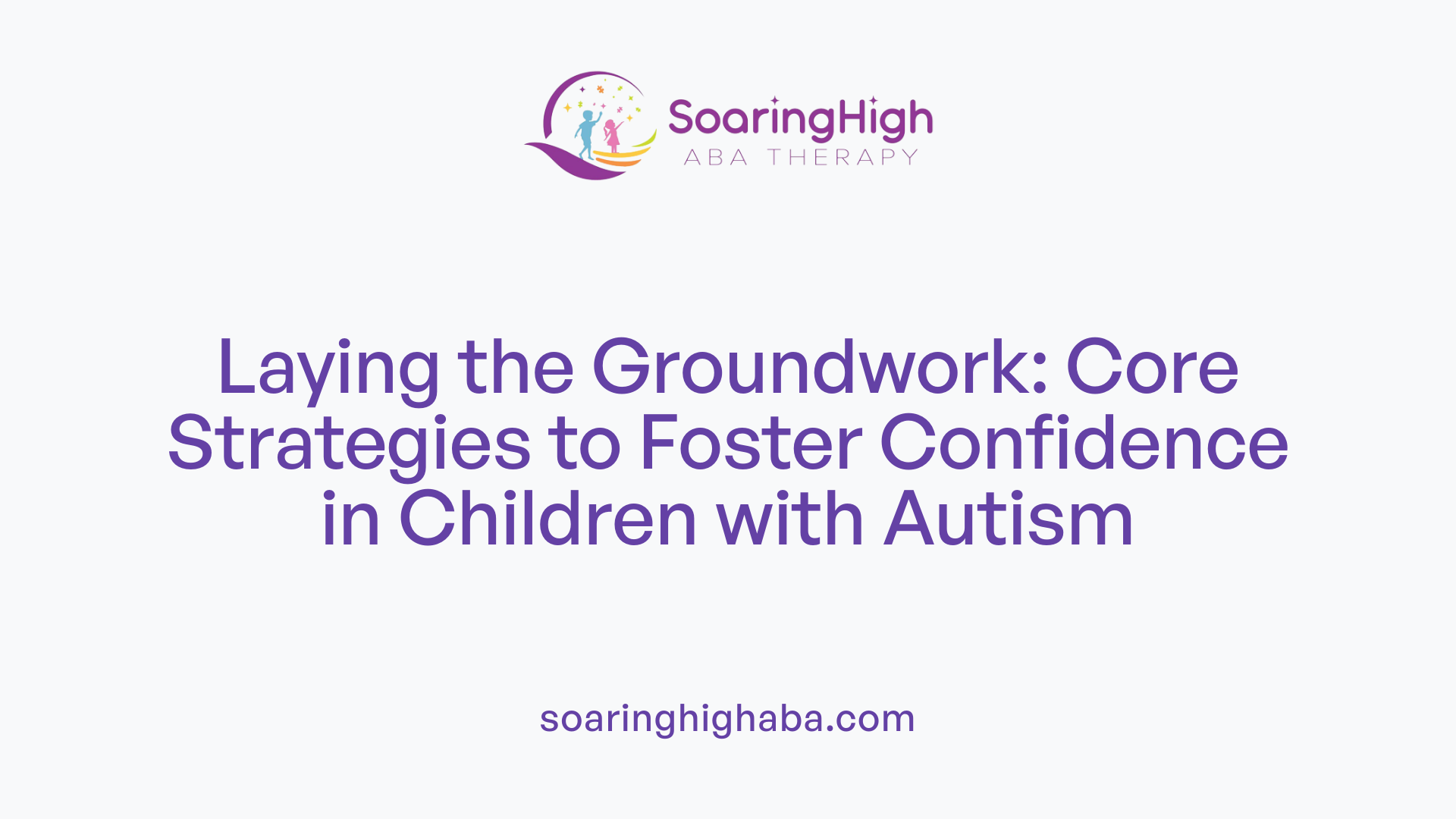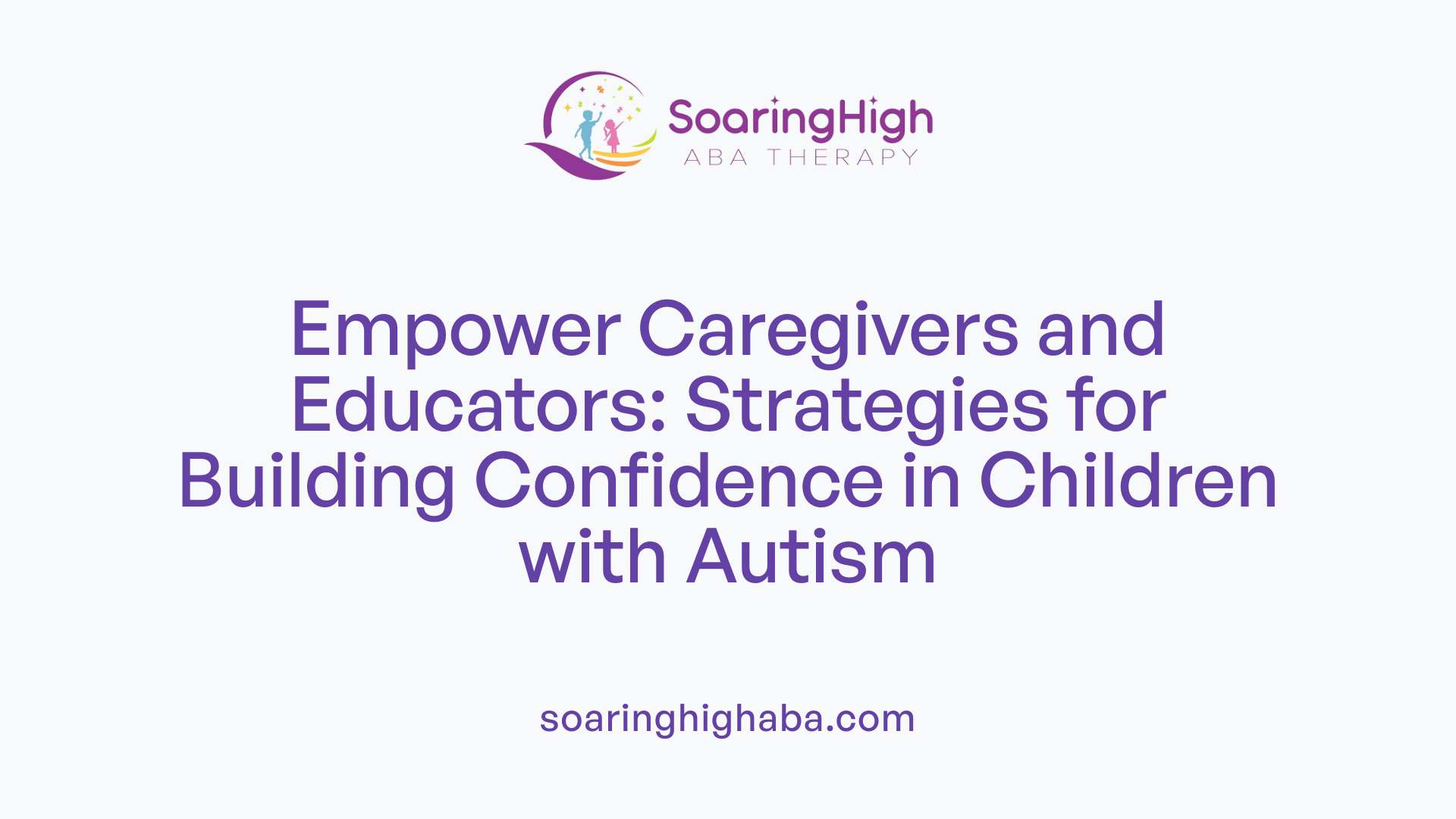Understanding Confidence and Its Role in Autism
Confidence influences a child's ability to participate fully in social, academic, and daily life activities. For children with autism, building self-esteem can be challenging but is achievable through targeted, compassionate approaches. This article explores comprehensive strategies, with a special focus on ABA techniques, to nurture confidence from early childhood through adolescence.
Foundations of Building Confidence in Children with Autism

What are general strategies for building confidence in children with autism?
Building confidence in children with autism involves a variety of supportive practices tailored to each child's unique needs and strengths. One effective approach is to identify and nurture their interests and talents. For example, creating strengths books or social stories highlights what they enjoy and excel at, promoting a positive self-image.
Positive reinforcement plays a central role. Rewarding efforts and successes, no matter how small, encourages children to keep trying and develop a sense of achievement. Techniques such as praise, tokens, or extra playtime reinforce desirable behaviors and help solidify their confidence.
Creating a safe, accepting environment at home and school is essential. Supporting social development by encouraging peer connections and participation in social groups fosters belonging and acceptance. Visual supports, consistent routines, and clear communication reduce anxiety and clarify expectations, enabling children to succeed in daily activities.
Fostering independence through small, manageable steps builds a child's self-reliance. Tasks like dressing, chores, or decision-making are opportunities for mastery, which enhances self-esteem.
Finally, modeling positive self-esteem behaviors is crucial. Caregivers and educators demonstrating patience, embracing failures as part of the learning process, and maintaining a hopeful attitude teach children valuable lessons about resilience and self-worth.
In summary, combining personalized interests, positive reinforcement, supportive environments, independence opportunities, and positive role-modeling creates a strong foundation for children with autism to develop confidence and thrive.
Role of ABA Therapy in Confidence Enhancement
How does ABA therapy support confidence development in children and teenagers with autism?
ABA (Applied Behavior Analysis) therapy plays a vital role in boosting confidence among children and teens on the autism spectrum. It does so by focusing on developing essential skills in communication, social interaction, and daily independence.
Through structured teaching methods like modeling, role-playing, and positive reinforcement, children learn and master new behaviors. These techniques help them feel more competent in handling everyday tasks, making social connections, and managing emotions.
ABA therapy sets small, attainable goals for each child, celebrating their efforts and successes along the way. This approach encourages perseverance and builds resilience, which are crucial for self-esteem.
Visual supports, routines, and tailored interventions create a predictable and safe environment. This stability helps children feel secure, reducing anxiety and fostering confidence.
Family involvement is also a key component. Therapists guide parents to reinforce skills at home, ensuring consistent learning and growth.
Moreover, ABA therapy teaches children to advocate for themselves, empowering them to express their needs and preferences. As they develop these skills, their sense of self-worth and independence grows.
In summary, ABA therapy supports confidence by teaching children skills to navigate their world confidently, reinforcing their efforts, and creating a supportive setting for ongoing growth and self-assurance.
Techniques in ABA to Foster Confidence
 ABA therapy uses several effective methods to help children develop confidence and independence. One of the main strategies is positive reinforcement, where desired behaviors are rewarded with praise, tokens, or other enjoyable outcomes. This pairing encourages children to repeat good behaviors and feel proud of their achievements.
ABA therapy uses several effective methods to help children develop confidence and independence. One of the main strategies is positive reinforcement, where desired behaviors are rewarded with praise, tokens, or other enjoyable outcomes. This pairing encourages children to repeat good behaviors and feel proud of their achievements.
Structured routines and clear goal setting are also central. Breaking tasks into small, manageable steps reduces feelings of overwhelm and helps children experience success. Visual supports like schedules and checklists make expectations clear and help them stay organized.
Focusing on a child’s strengths and interests plays a vital role. Activities such as social stories, which explain social situations, and role-playing exercises allow children to practice skills in a safe space. Physical activities and drama classes can boost confidence by providing achievement opportunities while improving social and emotional skills.
Family participation and personalized goals are essential. When parents and caregivers reinforce skills learned in therapy and set realistic, attainable goals, children are more likely to gain confidence and become more socially engaged. Overall, these methods work together to help children with autism build trust in their abilities, encouraging ongoing growth.
Supporting Caregivers and Educators in Confidence Building

How can caregivers and educators support confidence in children with autism using ABA?
Caregivers and educators play a vital role in nurturing confidence among children with autism by incorporating evidence-based ABA (Applied Behavior Analysis) strategies. These approaches focus on developing communication, social, and daily living skills through personalized activities that leverage positive reinforcement.
Implementing structured routines and clear, visual supports helps children feel secure and understand expectations, reducing anxiety. For example, visual schedules or picture cards can guide transitions and daily tasks, making them predictable and manageable.
Gradual exposure to social situations and new environments through role-playing or social stories prepares children for real-world interactions. Celebrating small successes and emphasizing efforts—rather than just achievements—boosts self-esteem and motivates continued effort.
Long-term ABA therapy involves setting realistic, attainable goals tailored to each child's strengths and challenges. Regular reinforcement and feedback help children recognize their progress, fostering resilience and confidence.
Creating a consistent, supportive environment where children feel valued encourages independence and social competence. Engaging families, teachers, and therapists in a collaborative approach ensures children receive reinforcement and encouragement across all settings, helping them evolve into confident and capable individuals.
Long-Term Benefits of ABA on Confidence and Development

How does ABA therapy influence a child's confidence and overall growth?
Applied Behavior Analysis (ABA) is a scientific approach widely used to support children with autism spectrum disorder. Its primary goal is to develop essential skills, including communication, social interaction, and independence.
Through structured learning and positive reinforcement, ABA helps children acquire new behaviors that foster self-confidence. It teaches important social skills like taking turns, sharing, and making eye contact through modeling and role-playing, making social interactions less intimidating.
ABA programs are tailored to each child's strengths and challenges, focusing on small, achievable goals that build a sense of mastery. As children successfully meet these goals, their confidence grows, encouraging them to try new activities and persist through difficulties.
By emphasizing routines, visual supports, and predictable environments, ABA reduces anxiety in daily routines, helping children feel more secure and confident. Communication skills—both verbal and non-verbal—are enhanced, allowing children to express needs and feelings more effectively.
In addition to developing social and communication skills, ABA supports emotional regulation and resilience. Techniques like recognizing emotions and calming strategies enable children to manage frustrations and setbacks positively.
Effective ABA therapy promotes independence in daily routines, such as dressing, grooming, and household tasks. This growing autonomy bolsters self-esteem and inspires children to take on more responsibilities.
Ultimately, ABA’s comprehensive approach helps children integrate better into social and educational settings. Engaging in group activities and practicing social skills in controlled environments prepares them for real-world interactions, fostering confidence in both personal and academic contexts.
| Aspect | Description | Benefits |
|---|---|---|
| Communication Skills | Verbal and non-verbal training | Better self-expression and understanding |
| Social Skills | Turn-taking, sharing, eye contact | Improved peer relationships |
| Daily Living Skills | Dressing, hygiene, routines | Increased independence |
| Emotional Regulation | Recognizing emotions, calming techniques | Greater resilience and emotional control |
| Confidence and Mastery | Small goals, positive reinforcement | Higher self-esteem and perseverance |
Research, such as that from the Association for Behavior Analysis International, underscores ABA’s long-term positive effects on social skills and confidence. When parents, educators, and therapists work together, children gain vital skills that promote lifelong growth and achievement.
Building a Confidence-Boosting Environment
Creating an environment where children feel safe, accepted, and valued is essential for fostering confidence, especially for children with autism. Promoting acceptance and diversity helps children appreciate differences and embrace their unique traits. Celebrating each child's individual achievements, no matter how small, reinforces their sense of self-worth.
Connecting children through shared interests or activities like social groups, clubs, or hobbies encourages social skills and peer bonding. Family involvement is also vital; supporting children as they explore their passions and strengths builds their confidence and independence.
Encouraging self-expression and emotional sharing, whether through talking about feelings, journaling, or engaging in calming activities, helps children understand and regulate their emotions. Using visual tools and providing safe spaces for dialogue make self-expression accessible.
Establishing predictable routines reduces anxiety, making children feel secure and confident. Approaches such as visual schedules and clear communication improve understanding and success in daily tasks.
By integrating these strategies—celebrating diversity, promoting shared interests, and ensuring a safe, structured environment—families and caregivers can significantly boost a child's confidence and foster their independence and self-esteem.
Practical Steps and Resources for Confidence Building

Setting realistic, achievable goals
Breaking tasks into small, manageable steps helps children experience success regularly. Whether it’s dressing independently or completing a homework assignment, attainable goals boost confidence and motivation.
Using visual supports and reinforcement tools
Visual schedules, picture cards, and social stories clarify expectations and reduce anxiety. Pairing behaviors with praise or tokens encourages children to repeat positive actions, reinforcing their sense of competence.
Engaging in hobbies, sports, and arts
Encouraging participation in activities like art, music, or sports allows children to explore their interests, develop skills, and experience mastery. These activities foster self-esteem and provide opportunities for social interaction.
Family and community involvement
Supporting children through family outings, playdates, and community programs builds social confidence. Celebrating differences and embracing unique traits reinforce pride and self-acceptance.
Accessing professional support and tailored programs
Professional therapies such as ABA are personalized to meet each child's needs, focusing on communication, social skills, and independence. Family involvement in these programs enhances progress.
Additional Resources
Research and organizations, like the Association for Behavior Analysis International, offer various tools and support networks. Combining these resources with family efforts creates a confident, resilient foundation for children with autism.
Fostering Lifelong Confidence Through Consistent Support
Building confidence in children with autism is a continuous journey that requires patience, understanding, and tailored strategies. Integrating ABA techniques with strengths-based approaches, environmental adjustments, and active family involvement creates a comprehensive framework for growth. By celebrating successes, fostering independence, and providing safe spaces to express themselves, caregivers and educators can empower children to develop resilience, social competence, and a positive sense of self. Ultimately, fostering lifelong confidence helps children reach their full potential and thrive in all areas of life.
References
- Tips for Developing Healthy Self-Esteem in Your Child with Autism
- Addressing Self-Esteem and Confidence in Children with Autism
- How ABA Therapy Prepares Kids for Life Experiences
- 7 Ways to Build Confidence in a Child with Autism
- Benefits of ABA Therapy for Children with Autism
- How Can ABA Therapy Help a Child With Autism? | UTBS
- Building confidence: autistic children and teenagers
- Building Self-Esteem in Kids with Autism - Childwise ABA
- Building Confidence in Kids with ABA Therapy - ABA Therapist Jobs





































































































